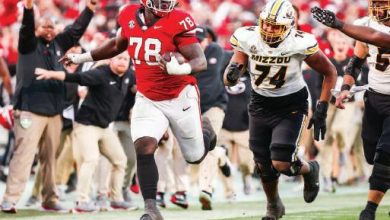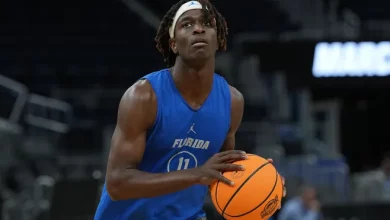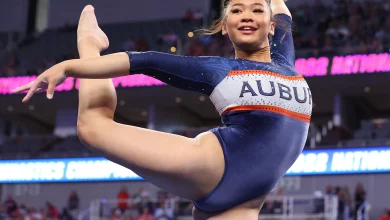Pulling away from the Commodores, Auburn basketball finds extra gear to win on the road.

The road to success in college basketball is often fraught with challenges: hostile environments, late-game pressure, and the constant need to adapt. But as Auburn basketball has demonstrated in recent seasons, the Tigers are no strangers to adversity, particularly on the road. In a particularly thrilling contest against the Vanderbilt Commodores, Auburn showcased its resilience, depth, and strategic prowess, finding an extra gear when it mattered most and securing a crucial victory.
This game encapsulated the essence of Auburn’s approach to the season—grinding out wins against difficult opponents, executing down the stretch, and relying on a mix of experienced players and dynamic newcomers. Let’s break down the key moments, players, and strategies that helped Auburn pull away from Vanderbilt in this decisive road game.
Setting the Stage: A Tough Road Test
Before the game, Auburn was already aware of the difficulty in facing Vanderbilt in Memorial Gymnasium, a venue that has often been a tough place for visiting teams. The Commodores, under head coach Jerry Stackhouse, have grown into a competitive SEC program, and their ability to frustrate opponents with a disciplined, hard-nosed defense and strategic offense had been well-established.
For Auburn, this was a pivotal SEC matchup in their quest for a high seed in the NCAA Tournament. With the SEC being one of the toughest basketball conferences in the country, every game had significant implications for postseason positioning. Despite their impressive home record, Auburn faced challenges on the road throughout the season. With a talented roster but inconsistent performances away from Auburn Arena, the Tigers needed to prove that they could rise to the occasion in a hostile environment.
Early Game Struggles: Finding Rhythm
From the opening tip, it was clear that Vanderbilt was going to make life difficult for Auburn. The Commodores, known for their slow, methodical offense and gritty defense, were effective in keeping the game at a pace that suited them. Auburn, on the other hand, struggled to find its offensive flow early. Turnovers, poor shooting, and a lack of execution on both ends of the floor allowed Vanderbilt to stay in the game.
Despite the early struggles, Auburn had some bright spots. Senior forward Jaylin Williams, known for his leadership and defensive prowess, played with a tenacity that helped keep his team afloat. Williams’ effort on the glass and his ability to switch on defense were key in limiting Vanderbilt’s second-chance opportunities. However, it was clear that Auburn was going to need more than just Williams’ energy to seize control of the game.
Vanderbilt’s defense, particularly their perimeter defense, caused problems for Auburn’s offense. The Tigers were forced to take contested shots and found themselves bogged down in the half-court. In addition, Vanderbilt’s star player, Liam Robbins, a 7-footer with excellent shot-blocking and rebounding ability, was able to make his presence felt on the defensive end.
The first half ended with the Commodores holding a slim lead, and it seemed as though Auburn might struggle to find its rhythm for the remainder of the contest. The Tigers were down by five points at the break, and it was clear that adjustments would need to be made if Auburn hoped to escape with a win.
Second Half: Auburn Finds Its Extra Gear
The second half began with a noticeable shift in Auburn’s energy and execution. Head coach Bruce Pearl, known for his fiery leadership and ability to make in-game adjustments, emphasized the need for better ball movement and greater intensity on defense. Auburn came out of the locker room with a renewed sense of urgency, looking to impose its style of play on Vanderbilt.
One of the most significant adjustments came on the offensive end. Auburn began to push the pace, increasing the tempo and using their athleticism to get out in transition. Instead of settling for contested jump shots, they attacked the basket more aggressively, drawing fouls and getting to the free-throw line. This shift in approach immediately paid dividends, as the Tigers started to chip away at the lead.
Auburn’s fast-break offense was at the heart of their comeback. The combination of guards Wendell Green Jr. and Zep Jasper pushing the ball up the court quickly, along with forward Allen Flanigan’s finishing ability in transition, put pressure on Vanderbilt’s defense. Flanigan, who had been quiet in the first half, found his rhythm and became a crucial scorer for Auburn in the second half. His ability to slash to the rim and convert tough finishes in the paint helped the Tigers close the gap.
At the same time, Auburn’s defense began to stifle Vanderbilt’s offensive flow. The Tigers, known for their tenacious full-court press and aggressive defense, intensified their efforts on that end of the floor. Guarding Vanderbilt’s shooters more closely and using their length to contest Robbins in the post, Auburn started to force turnovers and disrupt the Commodores’ rhythm.
Perhaps the most significant player in Auburn’s second-half surge was forward Johni Broome. The former transfer from Morehead State, who had been a consistent performer all season, elevated his game when his team needed it most. Broome became a force on both ends of the floor, grabbing key rebounds, finishing around the basket, and contributing with timely blocks and steals. His versatility and poise under pressure made him a matchup nightmare for Vanderbilt, and he helped shift the momentum in Auburn’s favor.
Key Players and Contributions
While Auburn’s team effort was evident throughout, several key players stood out in the victory. Jaylin Williams, despite having a quieter offensive game, was crucial in limiting Vanderbilt’s chances on the boards and providing leadership. His defensive versatility allowed Auburn to mix up their defensive schemes, creating opportunities for others to step up.
Wendell Green Jr., the team’s floor general, played with the confidence and leadership needed to orchestrate Auburn’s offense in the second half. Green’s ability to drive and kick, as well as his knack for making clutch shots, helped Auburn regain control of the game. He finished with a balanced stat line, contributing in both scoring and playmaking.
However, the standout performer of the night was Johni Broome, who demonstrated his all-around skill set. Broome finished with a double-double, scoring efficiently inside and grabbing key rebounds. His poise and maturity were on full display, and his leadership on both ends of the floor was a key factor in Auburn’s ability to pull away from Vanderbilt in the second half.
Closing Time: Auburn Clamps Down and Pulls Away
As the game entered its final stretch, Vanderbilt’s offense began to sputter under the weight of Auburn’s defensive intensity. The Tigers’ full-court press forced several turnovers, and their half-court defense became impenetrable. In contrast, Auburn executed its offense with precision, making the right passes, finding the open man, and converting in the clutch.
When the final buzzer sounded, Auburn had secured a hard-fought victory, winning by a comfortable margin after pulling away late in the second half. The final score was indicative of Auburn’s growth throughout the game. What began as a sluggish, turnover-ridden first half had turned into a dominant second-half performance, marked by strong defense, fast breaks, and efficient offense.
The Bigger Picture: What This Win Means for Auburn
This win against Vanderbilt was more than just another road victory in the SEC. It served as a statement about Auburn’s ability to adapt, persevere, and execute when it matters most. The Tigers proved that they could find an extra gear on the road, something that would be invaluable in their quest for an SEC title and a deep run in the NCAA Tournament.
Auburn’s second-half performance also highlighted the team’s depth. With players like Broome, Green, Williams, and Flanigan all contributing at different times, it was clear that Auburn’s roster was capable of stepping up in various ways. This balanced scoring and versatility give Auburn the flexibility to win in a variety of ways, an important asset as the season heads into its final stretch.
For head coach Bruce Pearl, the victory was a validation of his system and his players’ growth. Auburn had faced a number of tough road tests throughout the season, and each game was an opportunity for the Tigers to prove themselves. This win showcased their ability to respond to adversity and improve as the game progressed—a hallmark of a championship-contending team.
Looking Ahead
As Auburn continues its journey through the SEC schedule, this win against Vanderbilt will serve as a confidence booster. The Tigers have demonstrated that they can compete and thrive on the road, and that resilience will be crucial as they face other top-tier teams in the conference and beyond.
The road ahead is filled with challenges, but Auburn’s victory against Vanderbilt suggests that the Tigers are ready to rise to the occasion, especially when the stakes are high. If they can continue to harness the extra gear they found in this game, Auburn has the potential to make a serious run in both the SEC and NCAA Tournaments.
In the end, it was a gritty, hard-fought road win for Auburn, one that showcased the team’s growth, mental toughness, and undeniable talent. And as the season progresses, games like this will be remembered as the moments that define a championship-caliber team.









